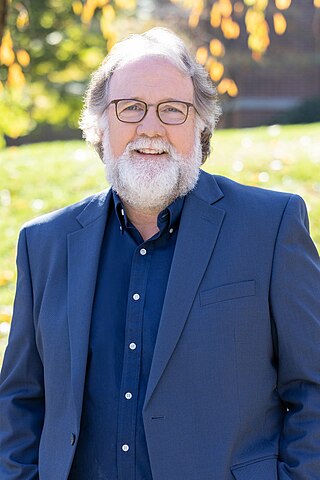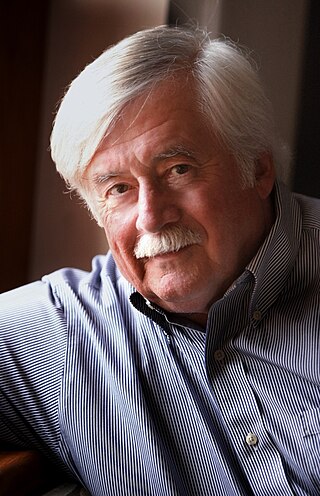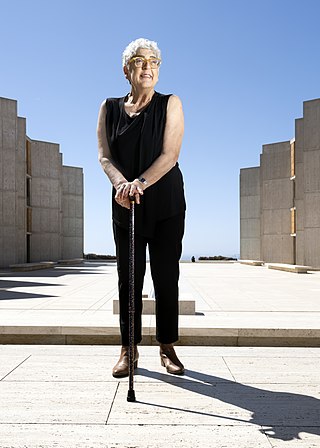Related Research Articles

Robert G. Roeder is an American biochemist. He is known as a pioneer scientist in eukaryotic transcription. He discovered three distinct nuclear RNA polymerases in 1969 and characterized many proteins involved in the regulation of transcription, including basic transcription factors and the first mammalian gene-specific activator over five decades of research. He is the recipient of the Gairdner Foundation International Award in 2000, the Albert Lasker Award for Basic Medical Research in 2003, and the Kyoto Prize in 2021. He currently serves as Arnold and Mabel Beckman Professor and Head of the Laboratory of Biochemical and Molecular Biology at The Rockefeller University.

Sean B. Carroll is an American evolutionary developmental biologist, author, educator and executive producer. He is a distinguished university professor at the University of Maryland and professor emeritus of molecular biology and genetics at the University of Wisconsin–Madison. His studies focus on the evolution of cis-regulatory elements in the regulation of gene expression in the context of biological development, using Drosophila as a model system. He is a member of the National Academy of Sciences, of the American Philosophical Society (2007), of the American Academy of Arts and Sciences and the American Association for Advancement of Science. He is a Howard Hughes Medical Institute investigator.

Susan Randi Wessler, ForMemRS, is an American plant molecular biologist and geneticist. She is Distinguished Professor of Genetics at the University of California, Riverside (UCR).

Thomas J. Silhavy is the Warner-Lambert Parke-Davis Professor of molecular biology at Princeton University. Silhavy is a bacterial geneticist who has made fundamental contributions to several different research fields. He is best known for his work on protein secretion, membrane biogenesis, and signal transduction. Using Escherichia coli as a model system, his lab was the first to isolate signal sequence mutations, identify a component of cellular protein secretion machinery, discover an integral membrane component of the outer membrane assembly machinery, and to identify and characterize a two-component regulatory system. Current work in his lab is focused on the mechanisms of outer membrane biogenesis and the regulatory systems that sense and respond to envelope stress and trigger the developmental pathway that allows cells to survive starvation. He is the author of more than 200 research articles and three books.

Elaine V. Fuchs is an American cell biologist known for her work on the biology and molecular mechanisms of mammalian skin and skin diseases, who helped lead the modernization of dermatology. Fuchs pioneered reverse genetics approaches, which assess protein function first and then assess its role in development and disease. In particular, Fuchs researches skin stem cells and their production of hair and skin. She is an investigator at the Howard Hughes Medical Institute and the Rebecca C. Lancefield Professor of Mammalian Cell Biology and Development at The Rockefeller University.

Catherine Dulac is a French–American biologist. She is the Higgins Professor in Molecular and Cellular Biology at Harvard University, where she served as department chair from 2007 to 2013. She is also an investigator at the Howard Hughes Medical Institute. She was born in 1963 in France. She came to the United States for her postdoctoral study in 1991.
Barbara J. Meyer is a biologist and genetist, noted for her pioneering research on lambda phage, a virus that infects bacteria; discovery of the master control gene involved in sex determination; and studies of gene regulation, particularly dosage compensation. Meyer's work has revealed mechanisms of sex determination and dosage compensation—that balance X-chromosome gene expression between the sexes in Caenorhabditis elegans that continue to serve as the foundation of diverse areas of study on chromosome structure and function today.
Utpal Banerjee is a distinguished professor of the department of molecular, cell and developmental biology at UCLA. He obtained his Bachelor of Science degree in chemistry from St. Stephen's College, Delhi University, India and obtained his Master of Science degree in physical chemistry from the Indian Institute of Technology, Kanpur, India. In 1984, he obtained a PhD in chemistry from the California Institute of Technology where he was also a postdoctoral Fellow in the laboratory of Seymour Benzer from 1984-1988.
The NAS Award in Molecular Biology is awarded by the U.S. National Academy of Sciences "for recent notable discovery in molecular biology by a young scientist who is a citizen of the United States." It has been awarded annually since its inception in 1962.

Aviv Regev is a computational biologist and systems biologist and Executive Vice President and Head of Genentech Research and Early Development in Genentech/Roche. She is a core member at the Broad Institute of MIT and Harvard and professor at the Department of Biology of the Massachusetts Institute of Technology. Regev is a pioneer of single cell genomics and of computational and systems biology of gene regulatory circuits. She founded and leads the Human Cell Atlas project, together with Sarah Teichmann.
The Edward Novitski Prize is awarded by the Genetics Society of America (GSA) to recognize an extraordinary level of creativity and intellectual ingenuity in solving significant problems in genetics research.
Stephen Joseph Elledge is an American geneticist. He is the current Gregor Mendel Professor of Genetics and of Medicine at the Department of Genetics of Harvard Medical School and in the Division of Genetics of the Brigham and Women's Hospital. His research is focused on the genetic and molecular mechanisms of eukaryotic response to DNA damage and is known as the discoverer of the DNA damage response (DDR).

Jennifer Anne Doudna is an American biochemist who has done pioneering work in CRISPR gene editing, and made other fundamental contributions in biochemistry and genetics. Doudna was one of the first women to share a Nobel in the sciences. She received the 2020 Nobel Prize in Chemistry, with Emmanuelle Charpentier, "for the development of a method for genome editing." She is the Li Ka Shing Chancellor's Chair Professor in the department of chemistry and the department of molecular and cell biology at the University of California, Berkeley. She has been an investigator with the Howard Hughes Medical Institute since 1997.

Joanne Chory is an American plant biologist and geneticist. Chory is a professor and director of the Plant Molecular and Cellular Biology Laboratory, at the Salk Institute for Biological Studies and an investigator of the Howard Hughes Medical Institute.
Judith Kimble is a Henry Vilas Professor of Biochemistry, Molecular Biology, Medical Genetics and Cell and Regenerative Biology at the University of Wisconsin–Madison and Investigator with the Howard Hughes Medical Institute (HHMI). Kimble’s research focuses on the molecular regulation of animal development.
Dominique C. Bergmann is a plant scientist with a specific focus on developmental biology and plant biology. Correspondingly, she is a professor of Biology at Stanford University and is in association with the Stanford Institute for Stem Cell Biology and Regenerative Medicine. Additionally, Bergmann is also an Investigator of the Howard Hughes Medical Institute.
Nikola Panayot Pavletich is the former chair of structural biology at Memorial Sloan Kettering Cancer Center.
Kim Orth is a microbiologist and biochemist. She is the Earl A. Forsythe chair in biomedical science and professor of molecular biology and biochemistry at UT Southwestern. She is a Howard Hughes Medical Institute investigator and a member of the National Academy of Sciences. Her research focuses on bacterial pathogenesis.

Joseph Heitman is an American physician-scientist focused on research in genetics, microbiology, and infectious diseases. He is the James B. Duke Professor and Chair of the Department of Molecular Genetics and Microbiology at Duke University School of Medicine.

Harmit Singh Malik is an Indian American evolutionary biologist who is a professor and associate director at the Fred Hutchinson Cancer Research Center. He was awarded the 2022 Genetics Society of America Edward Novitski Prize.
References
- ↑ Tompa, Rachel (April 18, 2018). "Dr. Sue Biggins elected to American Academy of Arts & Sciences". Fred Hutch News Service. Retrieved 2 August 2018.
- ↑ "Susan Biggins". Chemistry Tree. Retrieved 5 July 2018.
- ↑ "Sue Biggins". Fred Hutch Shared Resources. Retrieved 5 July 2018.
- ↑ "Faculty & Labs". Basic Sciences Division. Retrieved 5 July 2018.
- ↑ "Faculty". University of Washington Molecular Medicine & Mechanisms of Disease. Retrieved 5 July 2018.
- ↑ "National Academy of Sciences, Member Directory". National Academy of Sciences. Retrieved 5 July 2018.
- ↑ "2018 Fellows and International Honorary Members with their Affiliations at the Time of Election". American Academy of Arts and Sciences. Retrieved 5 July 2018.
- ↑ "National Academy of Sciences honors geneticist Sue Biggins". F. January 8, 2013. Retrieved 2 August 2018.
- ↑ "Sue Biggins receives the National Academy of Sciences Award in Molecular Biology". The Raymond and Beverly Sackler Scholars Program in Integrative Biophysics at the University of Washington. July 30, 2013. Retrieved 2 August 2018.
- ↑ "Sue Biggins". The Arnold and Mabel Beckman Foundation. Retrieved 1 August 2018.
- ↑ Tompa, Rachel (May 19, 2015). "'Every day something new': Dr. Sue Biggins selected as HHMI investigator". Fred Hutch News Service. Retrieved 1 August 2018.
- ↑ "Our Scientists". Howard Hughes Medical Institute. Retrieved 5 July 2018.
- ↑ "Fred Hutch researcher Sue Biggins awarded the Genetics Society of America's Novitski Prize". Fred Hutch News Service. January 21, 2015. Retrieved 1 August 2018.
- ↑ "The Edward Novitski Prize". Genetics Society of America. Retrieved 1 August 2018.
- ↑ "Sue Biggins, PhD - HHMI.org".